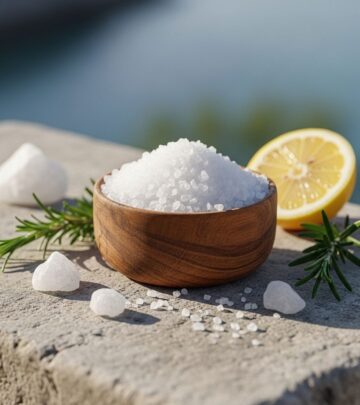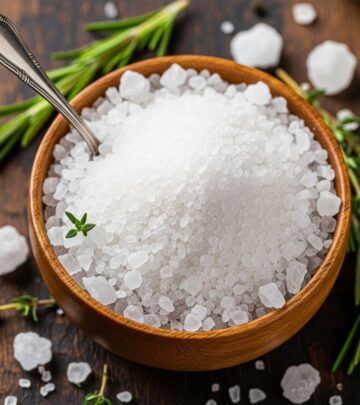11 Amazing Benefits Of Nutmeg: Uses, Nutrition, and Precautions
A dash of nutmeg delivers soothing comfort, improved sleep, and a brighter complexion.

Nutmeg is a globally cherished spice that brings a distinctive woody sweetness to both desserts and savory dishes. Beyond its flavor, nutmeg is packed with potent health-boosting compounds and has a history of traditional use for body, skin, and hair wellness. This article explores nutmeg’s science-backed benefits, its nutritional profile, recommended uses, and important precautions for safe consumption.
What Is Nutmeg?
Nutmeg is the seed of the evergreen tree Myristica fragrans, native to the Spice Islands of Indonesia. The spice is used globally for its unique, warming aroma and sweetly spicy flavor. Unlike mace (a spice from the same fruit’s covering), nutmeg is derived from the inner seed. Rich in vital nutrients, essential oils, and potent secondary metabolites, nutmeg finds its way into kitchens, cosmetics, and traditional remedies around the world.
Nutritional Profile Of Nutmeg
- Calories: Low-calorie content per serving
- Minerals: High in manganese, copper, magnesium, calcium, and iron
- Vitamins: Contains small amounts of vitamin B6, folate, riboflavin, thiamin, and vitamin C
- Plant Compounds: Myristicin, elemicin, sabinene, eugenol; with antioxidant and anti-inflammatory properties
- Fibre: Good source of dietary fiber
Top 11 Benefits Of Nutmeg
1. May Help Relieve Pain & Inflammation (Including Arthritis)
Nutmeg’s essential oils contain myristicin and eugenol, which have analgesic (pain-relieving) and anti-inflammatory properties. These compounds may help manage chronic joint pain and discomfort caused by conditions like arthritis.
- Topical application or gentle massage with nutmeg oil is a traditional remedy for sore joints and muscles.
- Including nutmeg in your diet could mildly support overall pain management.
2. May Support Better Sleep And Relieve Insomnia
Nutmeg is a time-honored natural sleep aid. Its magnesium content and psychoactive compounds can help calm the mind, reduce stress, and promote relaxation.
- A small pinch of nutmeg in warm milk before bed is a popular home remedy for better sleep quality.
- It may increase GABA (gamma-aminobutyric acid) activity in the brain, inducing a calming effect.
3. Can Alleviate Stress, Anxiety, And Mood Imbalances
Myristicin in nutmeg acts on the central nervous system, exhibiting mild psychoactive and adaptogenic effects. Regular, moderate intake may help reduce symptoms of stress and mild anxiety, promoting a sense of well-being.
4. Supports Heart Health: Controls Blood Pressure & Lowers Cholesterol
Nutmeg’s rich mineral content—especially potassium, magnesium, and copper—help maintain healthy blood pressure and regulate heart rate. Diets including nutmeg may indirectly support cardiovascular health by improving arterial health and supporting better blood circulation.
| Heart Healthy Component | Nutmeg’s Contribution |
|---|---|
| Potassium/Magnesium | Promotes vasodilation, lowers blood pressure |
| Manganese/Copper | Vital for metabolic cycles, antioxidant defense |
| Phytochemicals (Myristicin, Eugenol) | Reduce arterial inflammation and cholesterol |
5. Helps Regulate Blood Sugar
Nutmeg may help maintain healthy blood sugar levels due to its role in enhancing insulin sensitivity and controlling carbohydrate metabolism. While more studies are needed, some evidence suggests it could be a useful natural addition to diabetes management, when taken in moderation.
6. Promotes Digestive Health
This spice is valued in traditional medicine for alleviating digestive issues such as indigestion, bloating, nausea, and flatulence.
- The fiber in nutmeg aids digestion and regular bowel movements.
- It may relieve mild stomach discomfort and support the gut’s natural balance.
7. Boosts Brain Function & May Prevent Neurodegeneration
Nutmeg’s natural compounds have a mild psychotropic effect and may improve cognitive performance. Some research suggests neuroprotective properties against degenerative diseases, as its antioxidants help reduce oxidative stress in brain cells.
8. May Fight Bacterial Infections & Bad Breath
The essential oils in nutmeg possess strong antibacterial and antimicrobial activities.
Nutmeg can help:
- Inhibit bacteria that cause bad breath
- Reduce oral bacteria responsible for cavities and gum problems
- Ease symptoms of minor infections in the digestive tract
9. Contributes To Skin Health
Nutmeg’s antimicrobial, anti-inflammatory, and antioxidant properties make it an excellent natural component for skincare routines:
- Removes acne and blemishes: Homemade scrubs with nutmeg and honey can calm pimples and reduce scars.
- Brightens complexion: Nutmeg-based masks gently exfoliate and refresh the skin.
- Anti-aging activity: Antioxidant-rich compounds in nutmeg may smoothen fine lines and delay visible signs of aging.
10. Supports Hair Health
When included in hair oils or conditioners, nutmeg may:
- Boost scalp blood circulation
- Promote quicker hair growth
- Add shine and volume to hair
Nutmeg oil’s anti-bacterial effects can also help reduce scalp inflammations or infections.
11. May Aid Weight Management
Nutmeg’s high fiber helps you feel fuller for longer, potentially reducing overall calorie intake. Its ability to promote restful sleep and reduce stress can indirectly support healthy weight loss or maintenance efforts.
How To Use Nutmeg For Maximum Benefits
Nutmeg is versatile—enjoy it in both sweet and savory dishes, or use its oil topically. Here are some popular ways to include nutmeg in your daily regimen:
- Nutmeg Milk: Stir a pinch into warm milk before bedtime to support sleep and relaxation.
- Facial Scrub Or Mask: Blend ground nutmeg with honey and cinnamon for a gentle anti-acne face mask. Leave for 10–15 minutes, then rinse.
- Blemish Paste: Mix nutmeg powder and honey, apply to blemished areas, leave for 30 minutes, then rinse with cold water.
- Nutmeg in Cooking: Add to curries, desserts, oatmeal, and baked goods for flavor and nutrition.
Nutmeg: Dosage, Precautions & Side Effects
Recommended Intake: Nutmeg is safe in culinary amounts—typically no more than 1/4 to 1/2 teaspoon per serving.
Precautions:
- Pregnant and breastfeeding women should avoid nutmeg, as high doses may be unsafe.
- Individuals on sedatives or those with a history of seizures should use caution.
- Children should only consume nutmeg in very small quantities.
Possible Side Effects: Large doses of nutmeg can be toxic and may trigger serious side effects such as:
- Hallucinations or psychosis-like symptoms
- Nausea, vomiting, or dizziness
- Dry mouth or excessive thirst
- Irregular heartbeat in severe cases
If any adverse symptoms follow nutmeg consumption, seek medical advice immediately.
Nutritional Comparison Table
| Nutrient | Nutmeg (per 100g) |
|---|---|
| Calories | 525 kcal |
| Carbohydrates | 49.3 g |
| Protein | 5.8 g |
| Fat | 36.3 g |
| Fiber | 20.8 g |
| Manganese | ~2 mg (100%+ daily value) |
| Magnesium | 183 mg |
| Copper | 1.0 mg |
| Calcium | 184 mg |
| Potassium | 350 mg |
Frequently Asked Questions (FAQs)
Q: How much nutmeg is safe to eat daily?
A: Most adults can safely enjoy up to 1/4–1/2 teaspoon (about 1–2 grams) per day as part of food. Avoid large doses, which may be toxic.
Q: What are the symptoms of nutmeg toxicity?
A: Symptoms may include hallucinations, dizziness, nausea, heart palpitations, and confusion. Immediate medical help is recommended if an overdose is suspected.
Q: Can nutmeg cure insomnia?
A: Nutmeg may help some people sleep better due to its calming properties, but it should not replace established treatments for insomnia.
Q: Is nutmeg safe for children and pregnant women?
A: Children and pregnant or breastfeeding women should limit or avoid nutmeg due to potential toxicity in higher amounts.
Q: Does nutmeg help with acne?
A: Yes, nutmeg’s antibacterial and anti-inflammatory compounds can help reduce acne when used in face masks or spot treatments with honey or milk.
Conclusion
Nutmeg is more than just a flavoring—it’s a potent, health-promoting spice with benefits for the body, mind, skin, and hair. Used wisely and in moderation, it can be a valuable addition to your wellness routine. Always consult a healthcare professional if you have any underlying health conditions or are considering nutmeg supplements.
References
- https://stluciastar.com/15-amazing-benefits-of-nutmeg-jaiphal/
- https://www.tuasaude.com/en/nutmeg/
- https://www.stylecraze.com/articles/amazing-benefits-of-nutmegs/
- https://timesofindia.indiatimes.com/life-style/food-news/5-simple-ways-to-have-nutmeg-or-jaiphal-for-weight-loss/articleshow/112874958.cms
- https://betterme.world/articles/nutmeg-benefits/
- https://monkschai.com/en-us/blogs/news/nutmeg-benefits
- https://www.britannica.com/topic/nutmeg
- https://timesofindia.indiatimes.com/life-style/food-news/why-women-must-have-a-pinch-of-nutmeg-daily/articleshow/110999630.cms
Read full bio of Sneha Tete












